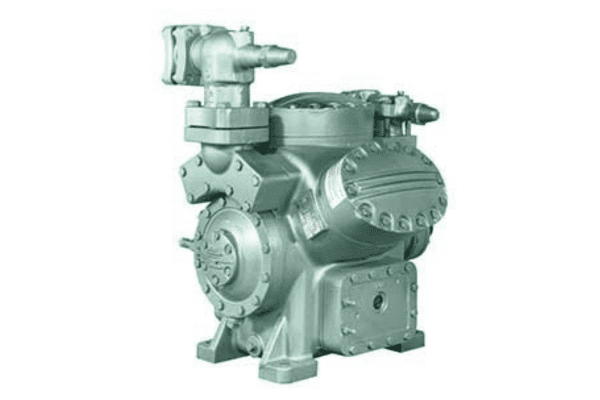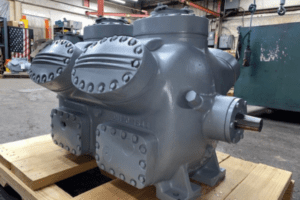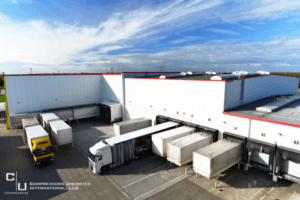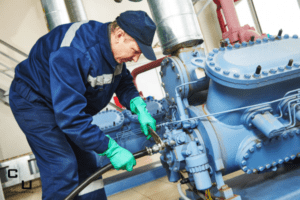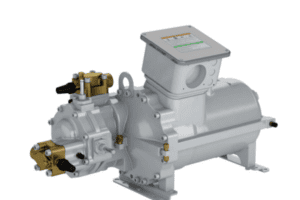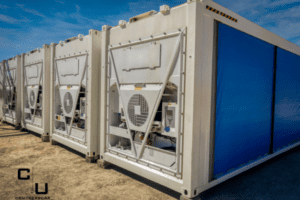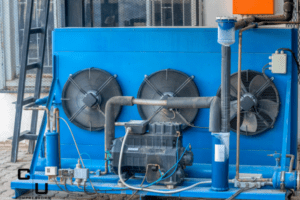Reciprocating compressors are often thought of in terms of their drawbacks.
A reciprocating compressor, also known as a piston compressor, has a positive displacement design. It uses a piston to compress refrigerant gas and deliver it at high pressure. Associated with the earliest commercial compressors, it has been largely supplanted by rotary (screw) compressors in many larger applications.
How Does a Reciprocating Compressor Work?
Inside the reciprocating compressor, compression cylinders, also called “stages,” can be present in quantities of one all the way up to six. They provide the necessary confinement for the process gas throughout the compression process.
A piston is driven in a reciprocating action to compress the gas. Single and dual-acting designs are available. In a dual-acting reciprocating compressor, the compression takes place on both sides of the piston during both the retreating stroke and the advancing one.
Dual-acting cylinders may be designed with a piston rod on both sides of the piston, helping with load balancing. Disposable piston rings and rider bands help to cut down on the wear of expensive components, but wear remains higher than in screw compressors.
Drawbacks of Reciprocating Compressors
Reciprocating compressors continue to have a niche in industrial and commercial applications. Still, they have also developed a reputation for certain drawbacks. Today’s reciprocating compressors are far more efficient and reliable than those of the past, but it is important to know their limitations.
The key drawbacks include:
1. Mechanical Wear and Tear
The compressing motion of the piston leads to inevitable wear, even when the machine is maintained at appropriate levels of lubrication. Engineers have extended the life of modern reciprocating compressors by adjusting the alloys that pistons are made of and making them more lightweight overall.
The screw compressor can be thought of as a direct response to the problems of a reciprocating unit. These use a mated pair of spiral rotors designed within a tight tolerance. The rotors compress the gas without being in direct contact and can maintain their efficiency as long as they are lubricated.
2. Vibration
Vibration is a significant hazard of a reciprocating compressor. It is another unavoidable byproduct of the compression action and must be maintained within tolerances to reduce the damage it can do.
Every time a cylinder opens or closes, pressure pulsation propagates through the unit’s piping, potentially resulting in fatigue cracks. Single-acting cylinders produce pressure pulsation at 1X running speed, while dual acting cylinders produce it at 2X running speed.
3. Noise
The piston action of the reciprocating compressor is inevitably noisier than the screw or centrifugal compressors. This limits the variety of places you might be able to set up your compressor.
Advantages of Reciprocating Compressor – When a Reciprocating Compressor is Preferred
For all the potential drawbacks, the advantages of a reciprocating compressor should not be forgotten. In the case of turning weaknesses into strengths, some constraints of a reciprocating compressor can be positive under certain circumstances.
1. You Need to Deploy a Compressor at Reduced Upfront Cost
Compared to the alternatives, reciprocating compressors are less expensive to source and deploy. This can be significant in an environment where you need a large fleet of compressors, as each one maybe hundreds of dollars cheaper than a comparable screw compressor.
When budget is crucial, consider a remanufactured commercial compressor. With a remanufactured compressor, you can enjoy the benefits of the reciprocating compressor you want at a deep discount – you can save anywhere from 10% to 30% — and get your unit delivered weeks sooner.
2. You Need a Smaller Compressor
In large part thanks to their relatively simple design, a reciprocating commercial compressor can have a more compact footprint than comparable screw compressors. If you have limited space (or few options for concealing the noise and vibration of your compressor) this can be very helpful.
3. You Are Running the Ideal Application for a Reciprocating Compressor
A reciprocating compressor is best used when you need high compression ratios – that is, ratios of discharge to suction pressure – per stage without requiring high flow rates. Lower duty cycles and limited hours of use per day also suggest a reciprocating compressor. If this describes your application, you might find that the right-sized reciprocating compressor is perfect for your needs.
You can defend against the mechanical issues common to reciprocating compressors by committing to a rigorous maintenance schedule. Like other compressors, reciprocating units should not fail “out of the blue” unless there is a maintenance oversight or a problem in the operating environment.
Keeping the right spare parts on hand lets you minimize downtime for your reciprocating compressor. In a true emergency, it pays to have a backup compressor on hand no matter what brand or style you use. This is where the excellent performance and reduced price of a remanufactured commercial compressor can be a real life-saver!

